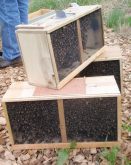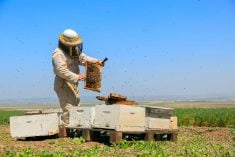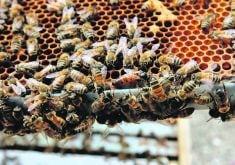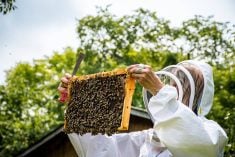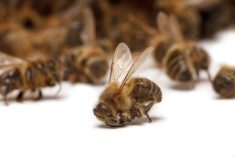“The varroa mite is completely widespread.”
– TODD YAKIMISHEN, MBA
Manitoba honey producers have inched a step closer toward calling for the elimination of a 22-year-old ban on imported bees from the U. S.
The Manitoba Beekeepers Association is asking for an industry summit meeting on allowing greater access to packaged bees from the continental U. S. and other countries.
It is the closest MBA has come to supporting the lifting of an import ban which has deeply divided the association since its implementation in 1987.
Read Also

Global humanitarian aid slashed by one-third
Humanitarian aid around the world was cut by a third in 2025 and Canada is one of the culprits.
A resolution adopted at MBA’s annual meeting in Neepawa last week asked the Canadian Honey Council for a stakeholder meeting to discuss amending an import embargo on bee packages from the U. S.
The meeting would involve producers, pollinators, equipment suppliers, honey packers and government, said Todd Yakimishen, MBA president.
Yakimishen stressed there would still be import permits and safety protocols and the door wouldn’t just be thrown open.
There would also have to be other restrictions, such as not allowing honeycomb across the border, he said.
NOW ENDEMIC
Ottawa imposed the current ban at the industry’s request to halt the spread of the parasitic varroa mite from the U. S. into Canada.
Since then, Manitoba beekeepers have been split between producers who want the ban maintained and those who want to build up their colonies by importing bees.
The meeting MBA wants would be similar to one held by CHC in October 2003, which resulted in the Canadian Food Inspection Agency amending the regulation in May 2004 to allow queen bee imports under an import protocol, Yakimishen said.
Currently, producers who want to import packaged bees can only get them from Australia, New Zealand and Chile, where the varroa is not a problem.
But beekeepers are starting to feel the ban may be moot because the varroa is now endemic throughout North America.
Yakimishen said an MBA survey this past year indicated members might support an import protocol for U. S. packaged bees.
“The border was closed initially because of varroa mites and now the varroa mite is completely widespread,” said Yakimishen, a producer from Dauphin. “In fact, there are places in Canada where there are varroa infestations that are higher than what they are in the U. S.”
Some beekeepers report an urgent need to replenish bee stocks with fresh imported genetics because of high colony losses in recent years.
Manitoba lost over 34 per cent of its honeybee colonies last winter. Losses throughout Canada and the rest of North America were also high.
Initially, the industry blamed a mysterious syndrome known as colony collapse disorder for excessive losses in bee colonies.
But scientists now feel a combination of factors, including the varroa mite, is responsible for the dramatic decline.
Honey production was down sharply throughout North America in 2009, although Manitoba managed to salvage an average crop overall.
Poor summer weather and colony losses combined to give the U. S. its worst honey crop on record, according to one industry report.
The result will be a spike in the price of honey, Bee Culture, a U. S. industry magazine, predicted.
“In the short run, the price of honey this winter is probably going to up some. Maybe a lot. And you may not be able to find local honey later this winter,” editor Kim Flottum wrote in a recent edition.
“My advice: buy lots now. It may not be there later and it will cost more later.”
EXPENSES
Beekeepers welcomed the promise of higher prices. But some feared it may not help offset high costs resulting from colony losses, weak queens and chemical treatments for mite problems.
“It’s just crazy,” said Bruce Podolski of Ethelbert. “More and more hives have to be treated for different things and that’s the expense. Years ago we didn’t have that.”
Others reacted cautiously to the price outlook.
“We’ll see strong prices but I wouldn’t hold my breath for really high prices,” said Paul Gregory of Fisher Branch. [email protected]




